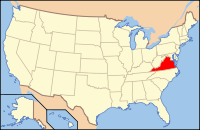Southampton County, VA
| Southampton County, Virginia | ||
|---|---|---|

Southampton County Courthouse
|
||
|
||
 Location in the U.S. state of Virginia |
||
 Virginia's location in the U.S. |
||
| Founded | 1749 | |
| Seat | Courtland | |
| Largest town | Courtland | |
| Area | ||
| • Total | 602 sq mi (1,559 km2) | |
| • Land | 599 sq mi (1,551 km2) | |
| • Water | 3.2 sq mi (8 km2), 0.5% | |
| Population (est.) | ||
| • (2015) | 18,109 | |
| • Density | 30/sq mi (12/km²) | |
| Congressional district | 4th | |
| Time zone | Eastern: UTC-5/-4 | |
| Website | www |
|
Southampton County is a county located on the southern border of the Commonwealth of Virginia. North Carolina is to the south. As of the 2010 census, the population was 18,570. Its county seat is Courtland.
During the 17th century, shortly after establishment of Jamestown, Virginia in 1607, English settlers explored and began settling the areas adjacent to Hampton Roads. In 1634, the English colony of Virginia was divided into eight shires (or counties) with a total population of approximately 5,000 inhabitants. Most of Southampton County was originally part of Warrosquyoake Shire. The shires were soon to be called counties. In 1637 Warrosquyoake Shire was renamed Isle of Wight County.
In 1749, the portion of Isle of Wight County west of the Blackwater River was organized as Southampton County. Later, part of Nansemond County, which is now the Independent City of Suffolk, was added to Southampton County. This area was cultivated for tobacco and later for mixed crops, dependent on the labor of African slaves after a relatively short period when many white indentured servants came to the colony.
In August 1831, enslaved Nat Turner led a slave rebellion of Black slaves in Southampton County against local whites. When the rebellion was crushed, Turner and his fellow rebels were executed. In a frenzied and fearful reaction to the rebellion, white militias and mobs captured other suspects and lynched approximately 200 Blacks in Southampton County, mostly slaves.
...
Wikipedia

